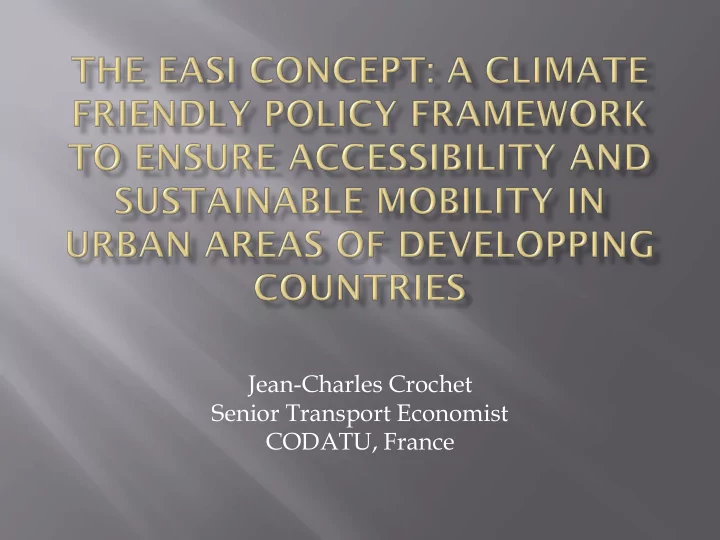

Jean-Charles Crochet Senior Transport Economist CODATU, France
Study of Policies for Sustainable Accessibility and Mobility in Urban Areas of Africa Why is the study important? Key issues concerning urban accessibility and mobility in Africa The main consequences of the current shortcomings Addressing urban accessibility and mobility issues in Africa (Enable, Avoid, Shift, Improve)
Financed by the Africa Transport Program (SSATP) and the Swiss Cooperation (SECO) Carried out in 2013-14 by a team led by Transitec Consultants and comprising CODATU, ODA Consultants, and the universities of Cape Town, Nairobi, and Dar es salaam Data collection in twenty African cities along eight main themes (governance, transport demand and supply, land use aspects, etc)
Only recent strategy study 100 at continental level Extremely fast population living in urban areas (percentage) 75 urbanization of Africa Accessibility as a key 50 factor of the efficiency of cities, poverty reduction, Africa and social cohesion 25 Asia Europe Urban transport among Latin America and the Caribbean Northern America the fastest growing sources Oceania 0 1950 1955 1960 1965 1970 1975 1980 1985 1990 1995 2000 2005 2010 2015 2020 2025 2030 2035 2040 2045 2050 of CO 2 emissions in Africa
Inadequate governance systems Little progress with respect to land use planning and control and the integration between land use and transport systems Insufficient planning and optimization of the transport system Limited availability of public transport services in the form of scheduled modern services, while informal, environmentally unsound, small public transport providers have developed fast and in an anarchic manner Serious deficiencies in the design of infrastructure and in its operation and maintenance High level of accidents and fatalities due to traffic Neglect for the environmental impact of transport and the resilience of cities
Heavy congestion and long travel times translate into poor accessibility Little incentive to use public transport and non- motorized transport modes High CO 2 emissions given level of economic development As illustrated by the case of Accra (Ghana) on the right
The ASI concept, a framework for reducing CO 2 emissions in developed countries with high motorization rates Avoid = reduce the need to travel (smart growth, transit oriented development, higher densities) Shift = increase the use of public transport and other more environmentally friendly modes of transport Improve = increase the energy efficiency of transport mode and vehicle technology
Plan for urban forms and land use that minimize the need for individual motorized travel and promote public transport and non- motorized transport modes Deploy transport infrastructure in a manner that promotes sound urban forms and land use Strengthen land use management
Adopt a multimodal approach to the development and management of urban transport systems Develop networks for non motorized modes d of transport that is continuous, safe, and accessible Provide an integrated and hierarchical public transport system with mass transit as its backbone Restructure, modernize, and promote paratransit operators
Improve planning, operation, and maintenance of urban roads to the benefit of environmentally friendly transport modes Implement realistic but gradually more demanding requirements in terms of fuel components, energy efficiency, and gas emissions Promote safe and environmentally responsible behavior by all transport stakeholders
Quality of governance is a key factor of performance 100 above average performance below average performance above average governance below average governance for Africa urban transport National urban growth rate systems 6,0% 75 4,0% 2,0 % The higher the cities’ Performance index CAT growth rate or per-capita RAB GAU 50 TUN ABI CAS DAK income, the lower the CAI ADA MAP LAG performance NAI DES OUA ACC KAM SFA KIN 25 KUM BOU Creating a sound enabling environment is therefore below average performance below average performance below average governance above average governance 0 essential: EASI is the 0 25 50 75 100 Governance index relevant framework for urban Africa
Adopt a national urban transport strategy Ensure that main public responsibilities are clearly assigned and carried out Set up metropolitan transport agencies Ensure development of human resources Set up sustainable financing systems Organize for continuous civil society participation Enhance the involvement of the private sector
Recommend
More recommend